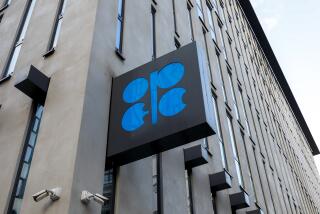United Arab Emirates Scorns OPEC Quotas
- Share via
MANAMA, Bahrain — The United Arab Emirates has carried out a threat to ignore its OPEC quota and authorized companies to pump almost 20% more oil in July, industry sources said Wednesday.
“This should bring (oil) prices down very quickly,” said one trader. “It is yet another link in the chain of disarray which is creeping into OPEC.”
OPEC members at their Vienna meeting earlier this month agreed to extend the group’s 15.06-million barrel per day quota for the rest of the year--a compromise between Persian Gulf states urging higher quotas and the majority, which wanted to curb output. Oil Minister Mana Said Oteiba has repeatedly rejected the UAE quota, claiming that, with recoverable reserves of about 100 billion barrels, the UAE is second to Saudi Arabia and deserves a much higher output.
The sources said the UAE Higher Council for Petroleum told companies in the main producing emirate of Abu Dhabi that they could boost July output to 1.1 million barrels per day from about 930,000 in June.
With Dubai pumping 350,000 to 400,000 barrels per day, total UAE production would rise to 1.5 million barrels per day--well above the quota of 948,000 barrels per day set by the Organization of Petroleum Exporting Countries.
The sources said the move showed the UAE was intent on rejecting its OPEC quota and would put an additional 200,000 to 300,000 barrels per day on the already oversupplied world oil market.
“The UAE completely rejects its OPEC quota of 948,000 (barrels per day). . . . The fair and official quota is 1.5 million (barrels per day),” Oteiba was quoted as saying in Morocco shortly after the OPEC conference in Vienna. The UAE cabinet backed his demands on Monday, saying it reasserted the emirates’ firm policy on output and prices as stated by Oteiba.
Prices fell after the Vienna meeting as some traders concluded that the cartel would have to shave back production more in the second half of the year if the drooping oil market is to be revived. Oil prices have been under pressure since the beginning of the year as overproduction outweighs demand.
North Sea Brent, the most widely traded international grade of oil, is already under $15 and fell 10 cents a barrel in New York Wednesday to $14.85 for oil delivered next month. The step-up in the UAE’s output was blamed for the day’s decline. West Texas Intermediate fell 8 cents a barrel to $15.92 for July delivery.
The secretary-general of the UAE Higher Council for Petroleum, Soheil al Mazrui, told companies in the state-owned Abu Dhabi National Oil Co. to raise July output to 1.1 million barrels per day, the sources said.
“They were told of their increased allowances for July two or three days ago,” one source said. Some sources said independent companies operating outside Abu Dhabi National Oil Co. were also given approval to produce up to 100,000 barrels per day more, which would boost Abu Dhabi’s total output to 1.2 million barrels per day.
The order was the first since the new petroleum council was formed early this month in a shake-up that oil sources said was designed to streamline UAE oil affairs and policy.
More to Read
Sign up for Essential California
The most important California stories and recommendations in your inbox every morning.
You may occasionally receive promotional content from the Los Angeles Times.










